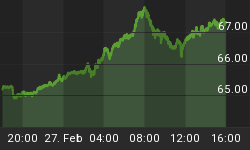Last Wednesday in a conference call followed around the world, German Chancellor Angela Merkel, French President Nicholas Sarkozy and Prime Minister George Papandreou of Greece gave broad assurances that in exchange for Greek commitment to enact further austerity measures, the flow of bailout funds will continue from the north. Although details were scarce, and no significant structural solutions were proposed, the symbolism was sufficient to diffuse mounting anxieties on both sides of the Atlantic. Stock markets of the major democracies rose strongly, while precious metals fell. But investors are right to wonder if anything of substance actually occurred.
The press conference was a testament to the power of showmanship. Offering no more than a short-term palliative to a serious long term problem, it succeeded in sweeping more dirt under the rug. The fact that the show was necessary at all is a function of the seriousness of the EU problem. Agreement to lend Greece more money averted sudden default and a likely banking crisis. Also, it appeared to reduce chances of a euro collapse.
The leaders proclaimed support for Greece, whose Prime Minister promised to grind his country under even more austerity. Meanwhile, the Franco-German axis will twist the arms of the remaining fourteen Eurozone nations to provide more funding. In reality, these smaller nations are quickly being relegated to the backseat. France and Germany will also pressure the additional ten EU member states (which are not members of the Eurozone), to provide funding under the auspices of the European Financial Security Mechanism (EFSM).
The activism of Merkel and Sarkozy should come as no surprise. French and German banks are the largest holders of Greek debt. The leaders' primary mission therefore is to protect the interests of their own financial behemoths. As a secondary concern, European financial interests are looking to slow the rate by which depositors are withdrawing funds from Greek banks. There is increasing panic that if Greece withdraws (or is expelled) from the Eurozone, euro-based deposits in Greek banks would then become transformed into drachma-based deposits. These of course would likely be substantially devalued.
The actions this week bought time for the Franco-German and Greek banks until major Greek debt rollovers in October and November. But they did not solve the massive, underlying problems, not just in Greece, but in many other indebted nations in the Eurozone.
Meanwhile, U.S. Treasury Secretary Tim Geithner has arrived in Europe to dispense wisdom as to how the Continent can handle the crisis. The puffed up Treasury secretary seems to be regaling European finance ministers with tales of how he managed the 2008 financial crisis from his former post as president of the New York Federal Reserve. He is suggesting that Europe increase the size of its current bailout funds. You can forgive European leaders who may perceive Mr. Geithner as somewhat less than credible on this point. There is mounting evidence that in terms of finding a solution to the sovereign debt crisis, U.S. and EU policies are diverging.
Increasingly, it appears that citizens of the twenty-seven nations of the EU will be liable for the greed and imprudence of EU banks, particularly those of France and Germany. This will be resented by voters, who have in fact shown signs of favoring greater taxes on the financial sector. These proposals are being resisted by the Americans. Furthermore, voters are showing increased unease with the entire notion of a European superstate.
Northern European voters dislike public subsidies for what they see as the spendthrift habits of PIIGS. Meanwhile, voters within PIIGS are beginning to chafe under the increasingly dictatorial tones of financiers and politicians who come from outside of their own borders. IMF and ECB officials no longer arrive to suggest ways to improve financial conditions but to issue austerity instructions in return for funding. Local citizens resent what they view as the calculated destruction of their economies by unaccountable outsiders.
This may be part of the ongoing end game to a star crossed financial union. The EU is founded on deception and lies. It was lies that enabled Greece to bypass the conditions of Eurozone entry. Deception led to the excessive borrowing of the PIIGS, which threatens now the solvency of the EU banks. Increasing voter horror and resentment is a massive democratic deficit, whereby entire countries are beginning to feel powerless in shaping their own destinies.
The market reaction this week suggested that investors believe that the politicians are in charge, and that they know what they are doing. It bought time. But, it remains to be seen whether that time will do any good.
Subscribe to Euro Pacific's Weekly Digest: Receive all commentaries by Peter Schiff, Michael Pento, and John Browne delivered to your inbox every Monday.
Click here to learn more about Euro Pacific's gold & silver investment options.
For a great primer on economics, be sure to pick up a copy of Peter Schiff's hit economic parable, How an Economy Grows and Why It Crashes.















